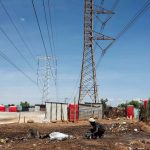Precarious lives of recyclers
A community of waste pickers stands to lose their homes and livelihoods despite contributing positively to the environment by recycling and lessening municipal landfill.
Author:
28 January 2019

Clementine Ntika’s day begins at 4am, when she starts her first round of rummaging through bins in the suburb of Centurion, Pretoria, for recyclable material to sell.
“I work all day, I take a few breaks from time to time, but after I rest I go out and come back and go out again, rummage, turn here and there,” she gestures.
Ntika, 32, is part of a community called Mushroomville, a group of about 100 waste pickers whose livelihoods and homes are under threat following rumours of the construction of a hotel. The waste pickers, who call themselves bagerezi (hustlers), have lived on the banks of the Hennops River for 16 years, making a living — and contributing positively to the environment — by selling recyclable goods.

Justice Shabangu, 38, moved from Nelspruit in 2002 for work, but his employment contract expired and he was left unemployed and homeless. Shabangu’s story is not unique; many others have moved to Pretoria to find work, only to end up in a similar situation.
Shabangu and others built makeshift plastic homes on a site that now houses the Gautrain bridge connecting Centurion and Hatfield. Once the bridge was built, they were forced to move to municipal land, which meant constant visits from the metro police.
“If they saw anything like these structures, they would just burn … because it is municipal land. When they arrive, they don’t ask. When shacks are like this, they just arrive and throw in a match,” he says scathingly.
They then moved to private land on the opposite bank of the Hennops River, where they live today.
“I don’t know what will happen because [they] found us here,” shrugs Shabangu.

Living in adversity
Ntika hurriedly washes her clothes and blanket in the uncomfortable heat — she’s worried it is going to rain later. She handwashes a mustard-coloured blanket in a red plastic bucket of clay-brown water, using a brick of green Sunlight soap, before leaving it to soak.
The maskandi music playing in the background serenades a toddler sleeping quietly under a blanket on a dusty old couch under a tree.
A devil-fork fence separates the recyclers from the lush, privately owned land next door that is overlooked by a dull block of flats. There’s a warning message on a pole at the entrance to Mushroomville, advising against illegal dumping. Piles of plastic bottles, cans, cardboard boxes and colourful bottle caps crop up between patches of grass, makeshift plastic rooms and mud. There is no clean water or electricity and the area is prone to flooding. There are also no toilets.

Glaring disparities
Mushroomville is close to SuperSport Park, the cricket grounds in Centurion. It is also close to the freeway, transport arteries, suburbs and shops. With a good route mapped out, some waste pickers make up to R1 800 a month, depending on how much their recyclable goods weigh.
In May 2017, an application was brought against the City of Tshwane to declare that it had failed its constitutional obligation towards the waste pickers and the owner of the property. The North Gauteng High Court in Pretoria ruled that the City should provide the community of Mushroomville with emergency accommodation in terms of the Emergency Housing Plan (EHP) under the Housing Act.
Sitting on a tatty old office chair and inhaling from her green tin of snuff, Lesotho-born Ntika, who moved to South Africa in 1995 after struggling to find a job at home, says she has been unemployed for a year since last working at a local restaurant.
She says this is not the first time the City of Tshwane has tried to move the waste pickers from their home, adding that they have been terrorised by the metro police for the past three years.
“Let them [the City] find us a better place then, let them give us a place and we will move for them. We cannot move without a guarantee of where we are going,” says Ntika, wiping her nose with an old petticoat.

Stuck with no money
Lesotho-born Mabulane Mosamane has been living in Mushroomville for eight years. She arrived in search of employment, borrowing the money to get to Pretoria.
“When I got there, the person who had told me about the job, he said, ‘You were supposed to arrive yesterday, the person who was walking out is the person who got the job when you did not show up.’ Meanwhile, I was struggling, not sure what to do,” she says, stuffing black snuff into a cavity in her back tooth.
Knowing she had to pay back the money she’d borrowed for the trip to South Africa, she tried to find work and then sold amagwinya(vetkoek) before ending up in Mushroomville.
Related article:
Although Mosamane lives alone, she has 11 children she is responsible for back home. In a bad month, she makes R800. In a good month, she makes R1 800 and sends R1 000 of this home. She sends another R600 to her son who is in form 1 (grade 8) and is left with R200, which she usually sends home in case her children need more money. She is usually left with nothing.
Pointing at three bags containing white bread on top of her plastic shack, she says: “Sometimes I eat bread as is and drink whatever you leave in the bottles I pick up … Now I am used to this life.”
“We also want money … we came here for money … we would not leave our children back home and come here for fun. Let them leave their homes, let them leave their children … we are here for a reason, we are tired of them [the property development company],” she says, angrily pushing some tins around.
She says going home is not an option. “We must buy them [children] things so they can eat. Where will we get this money in Lesotho?”

Snuffing out the pain
Alice Mojapelo, 45, makes R600 a month on average, which she says is not enough and on which she hardly gets by. Mojapelo has four children living with family in Pietersburg, Polokwane. She moved from there to Pretoria in 2001 in search of work.
“We want to work, if they [the City] move us, where will we work?
“If they want to move us, they must give us a place to work so that we can work and work for our children,” she says, applying Vaseline to a wet portion of her jet-black hair.
Taking a break from undoing her braids, Mojapelo gulps down some water and explains that snuff is nasal tobacco — the green tin of Ntsu snuff goes for R5 and the black tin of Taxi costs R8. She says most of them use snuff because it helps with headaches and pain.
Related article:
Mamshi Kau, 53, piles bottle caps, clear plastic bottles and green plastic bottles into an organised mess opposite the Mpact Recycling truck, the drivers of which come to weigh and buy their recyclable material every day between midday and 4pm.
Kau has five children living in Lesotho. She makes R1 000 in a good month and R500 in a bad month. “There is no work, we are hungry … here at least when we do this, we can send our children to school and they can eat the little that they do. We have nothing when you see us like this,” she says despondently.
“No one would like to touch dirt from a dustbin, no one. It is hunger … so we don’t know, when they say they want to move us, where they will move us to, because here we have an organised flow. On this day, we can get cardboard boxes from there, on this day we can get cans from there, you see?” she says, cracking someone’s Preggie Bellies Christmas CD and unscrewing bottle caps.
Livelihoods at stake
Women in Informal Employment: Globalizing and Organizing (Wiego) is a global network that supports inclusion in urban policies, organising and representation of the working poor in urban areas.
Wiego organisation and representation programme officer Vanessa Pillay told New Frame that if the eviction matter is taken on appeal after 29 January, they will apply as a friend of the court. Pillay says the issue is that the City wants to view this as a housing or homelessness issue.
“This is a livelihood issue and our understanding and reading of the judgments up until now is that they are looking at it purely from a housing perspective … but they are living there for socioeconomic reasons. They live there so that they can be close to the means of collection, which is the surrounding suburbs,” she says.
Related article:
Research commissioned by the environmental affairs department a few years ago shows that South Africa has an estimated 90 000 waste pickers nationwide, a figure that is probably higher as a result of rising unemployment.
Pillay says City authorities and society often view waste pickers as a nuisance, but they should be included in solid waste management systems and recognised for their role in providing an environmental service.
A concerned community member who started working with the bagerezi three years ago says this is about inherent basic rights. “In countries such as Brazil and Argentina, waste pickers are often rewarded for the public service they provide, their time and work, and South Africa needs to move toward that,” says Stefan van der Westhuizen.
Related article:
Pillay says the City is motivated by profit because recycling is a multimillion-rand industry, as opposed to taking socially responsible action.
“The City is equally guilty of criminalising the informality or poverty of waste pickers, so it needs to align its policy and its processes to recognise the work of waste pickers and integrate them properly into the City’s solid waste management system,” says Pillay.
The South African Waste Pickers Association (Sawpa) has expressed interest in helping waste pickers come together as a united organisation, allowing them to negotiate better with City authorities.

‘Reclamation project’ for Tshwane?
City of Tshwane mayoral committee member for agriculture and environmental management Mike Mkhari says they are avoiding eviction and dealing with the issue holistically, emphasising that waste pickers play an important role.
Mkhari told New Frame that the City has identified two pieces of land in the Centurion area after consultation with the provincial agriculture department — Hennopspark and Sutherland — and has sent applications to the national government for permission to set up waste-sorting facilities on this land.
“Once we have permission, we will fence in the land and provide infrastructure and ablution facilities,” says Mkhari.
Lawyers for Human Rights candidate attorney Afika Nqeto says the City has shown how anti-poor it is by choosing locations far from the bagerezi’s economic activities. “The most glaring issue with all the identified land sites is that they essentially banish poor people to live on the periphery of the cities. This is a blatant attempt by Tshwane to kick out undesirables and reclaim the city for their wealthier urban counterparts.”
Mkhari maintained that the waste pickers’ activities are polluting the area, saying it was undeniable because “they are there and they are sorting there”.

Bagerezi for life?
Van der Westhuizen says because they have no social capital, it is easy for authorities to blame bagerezi for the pollution in the river, which flows from Kempton Park in the east of Johannesburg through Tembisa and into Centurion.
The bagerezi say most of the pollution comes from Tembisa, Irene and Centurion. “They are trying to kick us out. They first started saying that it smells and that we are polluting the river. Would we do that? They just want to kick us out,” says Ntika.
“When we are done here, we sweep and we clean up so that it is clean,” says Mosamane, adding that bins for the waste would be handy.
Related article:
Mkhari says the City wants to formalise the waste pickers, teach them about business and regulate them, prompting Van der Westhuizen to question whether the waste pickers were consulted about what they want.
Van der Westhuizen says most people start out as bagerezi — because of the informal nature of the business, anyone can do it. Pillay says oftentimes mothers and daughters end up doing the same work. “It is then passed on from generation to generation and they grow up on the landfill. They help their moms collect on the street and they now make their livelihood in the same way,” she says.
Van der Westhuizen says the toddler who was sleeping on the couch is three-year-old Katlego, who he met when she was just an infant, head lolling as she slept strapped to her grandmother’s back while she did her rounds.
“She can be anything she wants to be, but I don’t want her to get trapped in that life. Nobody deserves to live like this” says Van der Westhuizen





